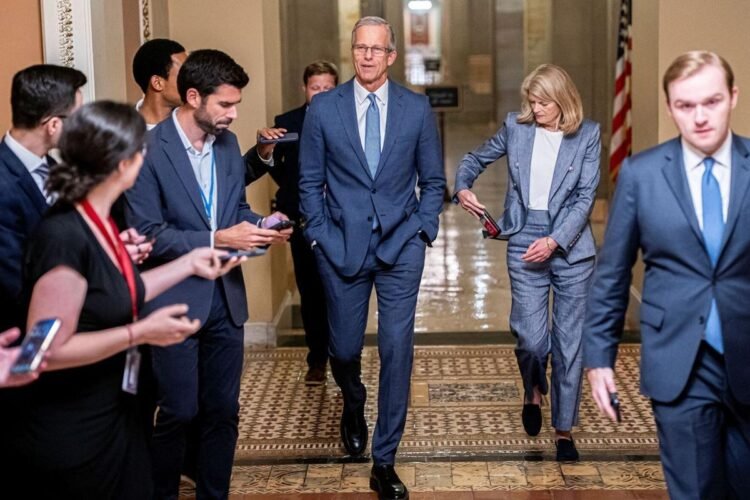With July 4 fast approaching, House Republicans are moving at breakneck speed to pass President Donald Trump’s sweeping $4.5 trillion tax and spending bill—an ambitious legislative gamble that blends aggressive tax cuts with controversial rollbacks in social safety net programs.
After narrowly clearing the Senate on Tuesday with Vice President JD Vance casting the tie-breaking vote, GOP leaders now face a daunting task in the House: convincing wary members to approve the final version of a bill they’ve barely had time to read.
“This is about delivering on our promise to the American people,” House Speaker Mike Johnson, R-La., said Tuesday, flanked by fellow Republican leaders. “After four years of Democrat failure, we intend to act boldly—and swiftly.”
But the urgency is drawing fire, even from within Republican ranks.
High Pressure, Tight Margins
The House Republican majority is razor-thin at 220-212, leaving little room for defectors. While the GOP passed its own version of the bill in May, the Senate’s revisions—many made at the last minute to secure key votes—have left some House members uneasy, particularly those from swing districts or those troubled by the depth of Medicaid and food assistance cuts.
The Senate version increases the projected federal deficit by $3.3 trillion over 10 years, a higher burden than the earlier House proposal. Yet House Majority Leader Steve Scalise has made clear: this is it.
“No more changes,” Scalise said Tuesday. “Even a single tweak could unravel the entire package.”
Trump’s Full-Court Press
President Trump is personally pushing for a final vote by Independence Day, seeing the legislation as a centerpiece of his 2025 comeback agenda. On Truth Social, he hailed the bill’s benefits—expanded tax breaks, new deductions for tips and overtime, and billions for defense and immigration enforcement.
“We can have all of this right now,” Trump posted, “but only if the House GOP UNITES and ignores the GRANDSTANDERS.”
The message is clear: cross the president at your peril.
When Sen. Thom Tillis, R-N.C., opposed the bill over the weekend, Trump immediately called for a primary challenger. Days later, Tillis announced he would not seek reelection.
Rep. Thomas Massie, R-Ky., who has voiced opposition, is already under political fire from Trump’s allies.
Cuts, Critics, and the Cost
The bill permanently extends key tax cuts from Trump’s 2017 tax overhaul and adds new provisions aimed at working-class voters. But to offset costs, it slices $350 billion from Medicaid and SNAP (food assistance), expands work requirements, and shifts more program costs to states.
Democrats have slammed the proposal as heartless and rushed.
“This isn’t about policy—it’s about ego,” said Rep. Jim McGovern, D-Mass., referring to Trump’s July 4 deadline. “We’re tearing away health care and food from the most vulnerable for a photo op.”
House Democratic Leader Hakeem Jeffries warned that Medicaid cuts could leave many Americans unable to access lifesaving care. “They’re literally ripping food from the mouths of children and seniors,” he said.
Big Rewards for the Wealthy
According to the nonpartisan Tax Policy Center, the bill would provide an average $10,950 tax cut to the wealthiest Americans next year. The lowest-income households would see just $150 in relief.
Still, Republicans argue the changes will fuel economic growth. “Smaller tax bills, bigger paychecks,” said Senate GOP leader John Thune. “This is about unlocking America’s full economic potential.”
A Final Vote—And Fallout
The House vote is expected Wednesday, with leadership confident that fear of political consequences—and Trump’s considerable sway—will keep defections to a minimum.
But if the gamble fails, it could fracture GOP unity and cast doubt on the president’s ability to execute his second-term agenda.
As one senior Republican aide put it, “This isn’t just about taxes—it’s a loyalty test.”

 English
English



























































